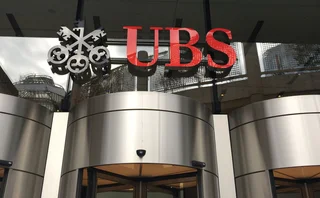
Moody's correct on swaps bail-in risk – Risk.net poll
Almost 90% of respondents to a Risk.net poll say the risk of swaps counterparties suffering losses in the event of a large bank’s resolution is small

Almost 90% of respondents to a Risk.net poll believe ratings agencies are right to assume derivatives counterparties will be safe from a bail-in under new bank resolution rules.
Moody's counterparty risk assessment (CRA), launched in March, captures the probability that a bank will default on its derivatives obligations. So far the CRAs for US and European banks have assumed derivatives counterparties to a stricken bank are less likely to lose money than their senior unsecured debt holders, based on assumptions that bonds will be subordinated to derivatives under new resolution frameworks, and that regulators are unlikely to bail-in derivatives anyway.
Since Moody's announcement, both Fitch and DBRS have confirmed they are considering de-linking ratings for senior unsecured and derivatives exposures in their ratings frameworks based on similar arguments.
In the Risk.net poll, 87% of respondents believe the risk that losses will be inflicted on swap counterparties during the resolution of a big bank is low. However, 11% say the risk is high, and that losses will not be limited to bonds. Just 4% believe the risk is moderate and will differ on a case-by-case basis.
So far, Moody's CRAs have placed swap exposures one to two notches above the senior unsecured debt rating, which traditionally was used as the reference point for derivatives contracts.
Derivatives end-users, which often have minimum ratings requirements for counterparties, have been hesitant to accept Moody's new higher CRA, due to uncertainty around how resolution frameworks will work in practice. However, if the practice becomes more widely accepted, and other ratings agencies follow suit, some say this could help legitimise the methodology.
"Moody's has come up with this analysis, but it is just one agency. I don't know that it's accepted across the industry that derivatives ratings should be higher than deposit ratings. Unless it becomes more widely accepted, it's a bit difficult to pitch this to clients and decision-makers," said Mark Ryan, senior derivatives and counterparty risk manager at Aviva Investors in London, speaking to Risk.net last month.
Derivatives technically can be bailed in under EU and US resolution frameworks, however the potentially disruptive knock-on effects of doing so means regulators may choose to exempt these exposures.
European regulators say they do not intend to exclude derivatives, and are drawing up a framework for the close-out and valuation of derivatives for the purpose of bailing them in.
That may be easier said than done, others counter, as when regulators end up actually putting these rules into practice, volatile market conditions could make valuing and bailing-in derivatives very tricky.
Higher counterparty risk ratings are a particular benefit for banks involved in structured finance. A number of banks' senior unsecured ratings have fallen to a point where they have to find a replacement for themselves in swap transactions with securitisation vehicles – a very difficult and potentially costly exercise.
The CRA however could lift them back up and allow them to remain in these transactions without the whole structure suffering a downgrade. One structured finance trader says his reaction to the Moody's CRA proposals is that "Christmas has come early".
Only users who have a paid subscription or are part of a corporate subscription are able to print or copy content.
To access these options, along with all other subscription benefits, please contact info@risk.net or view our subscription options here: http://subscriptions.risk.net/subscribe
You are currently unable to print this content. Please contact info@risk.net to find out more.
You are currently unable to copy this content. Please contact info@risk.net to find out more.
Copyright Infopro Digital Limited. All rights reserved.
As outlined in our terms and conditions, https://www.infopro-digital.com/terms-and-conditions/subscriptions/ (point 2.4), printing is limited to a single copy.
If you would like to purchase additional rights please email info@risk.net
Copyright Infopro Digital Limited. All rights reserved.
You may share this content using our article tools. As outlined in our terms and conditions, https://www.infopro-digital.com/terms-and-conditions/subscriptions/ (clause 2.4), an Authorised User may only make one copy of the materials for their own personal use. You must also comply with the restrictions in clause 2.5.
If you would like to purchase additional rights please email info@risk.net
More on Markets
Isda to finalise drafting updated FX definitions this year
New definitions on disruption events and fallbacks are core focus
Treasury clearing timeline ‘too aggressive’ says BofA rates head
Sifma gears up for extension talks with incoming SEC and Treasury officials
SG looks beyond equity derivatives in new markets push
French bank aims to expand fixed income business to achieve “more stable” revenues across asset mix
Does no-hedge strategy stack up for mag seven mavericks?
At Amazon, Meta and Tesla, the lack of FX hedging might raise eyebrows, but isn’t necessarily a losing technique
HKMA’s renminbi repo plans boost hopes for onshore access
Market participants optimistic that new provisions for offshore repos of onshore bonds is first step towards mainland access
Euro swap spread volatility challenges Bund’s hedging role
German Bunds face scrutiny as euro swap spreads turn negative, forcing traders to rethink hedging strategies
UBS sterling rates head departs
Ian Hale left the Swiss bank in December
Bloomberg offers auto-RFQ chat feed – but banks want a bigger prize
Traders hope for unfettered access to IB chat so they can build their own AI-enhanced trading tools







